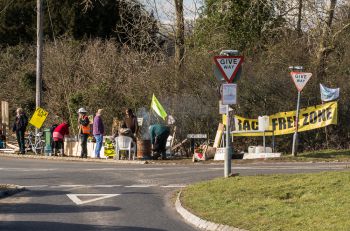Shale gas policy debate likely to continue as both sides struggle to create compelling UK-relevant argument
By: Neil Vowles
Last updated: Friday, 16 August 2019

Neither pro or anti shale gas actors show signs of winning the policy debate, according to new research from the Science Policy Research Unit at the University of Sussex.
The research, funded jointly by the Natural Environment and Economic and Social Research Councils, reveals the issues that have dominated the Westminster policy debate over shale gas and hydraulic fracturing (‘fracking’) over the past decade.
Researchers carried out 30 interviews with well-placed stakeholders and analysed 1,557 documents, including policy documents and transcripts of parliamentary debate. The analysis revealed 9 key perspectives or so-called ‘frames’ on shale gas development. Four of these frames are in favour of shale development with the remaining 5 being hostile toward the prospect of a domestic shale gas industry.
Over the timeframe studied (2010-2018) pro-shale development frames were more frequently used, with references to the potential economic and energy security benefits of developing a domestic shale gas industry being the most common of these. Although less frequently used, anti-shale development frames were still widespread, and their use was relatively evenly distributed amongst the 5 frames.
Overall, the analysis reveals a high level of disagreement over the framing of shale gas development within UK policy circles. The study also suggests that both sides of the debate struggle to put forward compelling arguments whilst the debate remains anticipatory – that is, whilst a shale gas industry in the UK remains a future prospect. This leaves both sides with no choice but to extrapolate knowledge about impacts – whether adverse or beneficial – from the case of the United States in ways that appear easily undermined by their opponents.
In addition, on the basis of this analysis there are signs both that the Government have struggled to counter claims of ‘bad gas governance’, and that the attempt to reframe shale gas as an environmentally friendly ‘bridging fuel’ has had limited appeal beyond the Government and Industry.
Any shift in this rather deadlocked debate seems more likely to come from either a sudden event (e.g. a change of government, an incident at an exploration site, or a geopolitical incident with energy security implications) or a more gradual loss of enthusiasm for one side or the other, rather than a decisive victory in debate.
Lead author Dr Laurence Williams, Research Fellow in Environmental Politics at the University of Sussex, said: “Our study demonstrates the key issues over which the UK shale policy debate has been fought, as well as the ways policy-makers and other stakeholders have tried to bring the public round to their way of thinking. We confirm previous research findings about the importance of arguments about governance and local community influence over decision making in anti-shale discourse, and add that debate over whether shale gas development will industrialise the countryside seems particularly prominent in the UK.”
Co-author Professor Benjamin K. Sovacool, Professor of Energy Policy at the University of Sussex, said: “Our research underscores how contested emerging energy options such as shale-gas are, and how uncertain their future will remain. It ultimately implies that progress on meeting future energy targets—especially those that involve fossil fuels—will be a combination of unpredictable, debatable, and political.”
The nine key perspectives or ‘frames’ identified were:
Pro-shale development frames
• ‘Low impact development’ - views shale development as only producing mundane nuisance impacts which will not amount to industrialisation of the countryside
• ‘Lower carbon fuel’ - views the development of a domestic shale gas industry as compatible with if not a positive contribution towards meeting the UK’s climate change targets
• ‘Manageable risk’ – views the risks associated with hydraulic fracturing as manageable, and UK regulation as world-leading
• ‘Wealth and security’ – views UK shale resources as an opportunity for potentially substantial economic and energy security benefits
Anti-shale development frames
• ‘Bad gas governance’ – views shale development as being imposed on unwilling local communities by a central Government behaving questionably
• ‘Dirty fossil fuel’ – views the development of a domestic shale gas industry as irreconcilable with the UK’s climate change targets
• ‘Elusive threats’ – views hydraulic fracturing as novel, highly risky, and as the subject of ongoing uncertainty; views accidents as inevitable, especially in the context of perceptions of inadequate regulations and underfunded regulators
• ‘Industrialise the countryside’ – views shale gas development as industrialising the British countryside
• ‘No repeat revolution’ – sceptical about the prospects of a UK industry, ranging from doubts over a reduction in gas prices to scepticism over the emergence of an industry of any significance at all.
The journal paper “The discursive politics of ‘fracking’: Frames, storylines, and the anticipatory contestation of shale gas development in the United Kingdom” has been published by Global Environmental Change and is available here.
